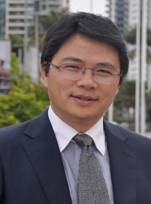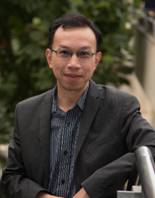Modulation of the osteoimmune environment by biomaterials for osteogenesis
SEMINAR
Biomaterials and Tissue Engineering Research Center, Shanghai Institute of Ceramics, Chinese Academy of Sciences
中国科学院上海硅酸盐研究所生物材料与组织工程研究中心
Modulation of the osteoimmune environment by biomaterials for osteogenesis
Speaker:Prof. Yin Xiao
(Queensland University of Technology, Australia)
Molecularly Engineered Graphene Surfaces for Bio-Applications
Speaker:Prof. Wenrong Yang
(Deakin University, Australia)
报告时间:2018年5月16日(星期三)上午9:30
报告地点:4号楼14楼第一会议室
联系人:吴成铁(52412249)
Personal information:
 Dr. Xiao is a Professor at Queensland University of Technology (QUT), a program leader of Bone and Joint Disorders Program at Institute of Health and Biomedical Innovation (IHBI), and a group leader of Bone Biology and Tissue Engineering at IHBI. He obtained his Bachelor and Master degrees in Dentistry from Wuhan University, China. In 2000, he graduated with a PhD from School of Dentistry at the University of Queensland (UQ), Australia. He worked as a research officer at UQ for two years following his graduation and an NHMRC Research Fellowship at the School of Life Sciences at QUT from 2003. In 2005 and 2012 he was appointed an Associate Professor and Professor, respectively in Bone Biology and Tissue Engineering at QUT. He is currently the Director of Australia-China Centre for Tissue Engineering and Regenerative Medicine (ACCTERM). In the past five years, he has attracted more than $8 million in research funding from nationally competitive grant schemes and other research foundations. Professor Xiao’s work has predominantly focused on the fields of bone biology, biomaterials, stem cells, dentistry, osteoarthritis, and tissue regeneration/engineering. He has published two edited books, 10 invited book chapters and more than 200 journal papers with a H-index of 50.
Dr. Xiao is a Professor at Queensland University of Technology (QUT), a program leader of Bone and Joint Disorders Program at Institute of Health and Biomedical Innovation (IHBI), and a group leader of Bone Biology and Tissue Engineering at IHBI. He obtained his Bachelor and Master degrees in Dentistry from Wuhan University, China. In 2000, he graduated with a PhD from School of Dentistry at the University of Queensland (UQ), Australia. He worked as a research officer at UQ for two years following his graduation and an NHMRC Research Fellowship at the School of Life Sciences at QUT from 2003. In 2005 and 2012 he was appointed an Associate Professor and Professor, respectively in Bone Biology and Tissue Engineering at QUT. He is currently the Director of Australia-China Centre for Tissue Engineering and Regenerative Medicine (ACCTERM). In the past five years, he has attracted more than $8 million in research funding from nationally competitive grant schemes and other research foundations. Professor Xiao’s work has predominantly focused on the fields of bone biology, biomaterials, stem cells, dentistry, osteoarthritis, and tissue regeneration/engineering. He has published two edited books, 10 invited book chapters and more than 200 journal papers with a H-index of 50.
Abstract:
Personal information:
 Wenrong Yang is a senior research fellow in School of Life and Environmental Sciences at Deakin University. Wenrong received his PhD from the University of New South Wales (UNSW) in 2002 under Prof. Justin Gooding and Bryn Hibbert. He then worked at CSIRO as a postdoctoral fellow before returning to UNSW in 2005. He was awarded a University of Sydney Research Fellowship in 2007, and then he joined Deakin University at the end of 2010. Currently he leads a biomimetic engineering research group with 2 postdoc, 5 PhD and 2 Masters students in Deakin University. His research interests include producing nanostructured surfaces with unique functionalities, nanomaterials-based biosensors and molecular electronics. He has authored ca 160 peer-reviewed papers including publications in journals PNAS, Angew. Chem. Int. Ed., J. Amer. Chem. Soc., ACS Nano and ACS Catalysis.
Wenrong Yang is a senior research fellow in School of Life and Environmental Sciences at Deakin University. Wenrong received his PhD from the University of New South Wales (UNSW) in 2002 under Prof. Justin Gooding and Bryn Hibbert. He then worked at CSIRO as a postdoctoral fellow before returning to UNSW in 2005. He was awarded a University of Sydney Research Fellowship in 2007, and then he joined Deakin University at the end of 2010. Currently he leads a biomimetic engineering research group with 2 postdoc, 5 PhD and 2 Masters students in Deakin University. His research interests include producing nanostructured surfaces with unique functionalities, nanomaterials-based biosensors and molecular electronics. He has authored ca 160 peer-reviewed papers including publications in journals PNAS, Angew. Chem. Int. Ed., J. Amer. Chem. Soc., ACS Nano and ACS Catalysis.
Abstract:
Controlling surface interactions between an immobilisation surface and enzymes can be used to control enzyme activity, including substrate selectivity. Here we use modified graphene as a controllable surface to improve the activity and selectivity of enzymes. In addition to fundamental understanding of the ability of surfaces to modify enzyme activity, the graphene-lipase system offers a new controllable immobilised enzyme catalyst for industrial applications. The research will lead to improved understanding of the basic mechanisms of protein self-assembly and interaction with surfaces to control enzyme functionality, which will be utilised to produce next generation immobilised catalysts, bioelectronics and biosensors.
欢迎广大科研人员和研究生参加!


 当前位置:
当前位置:

